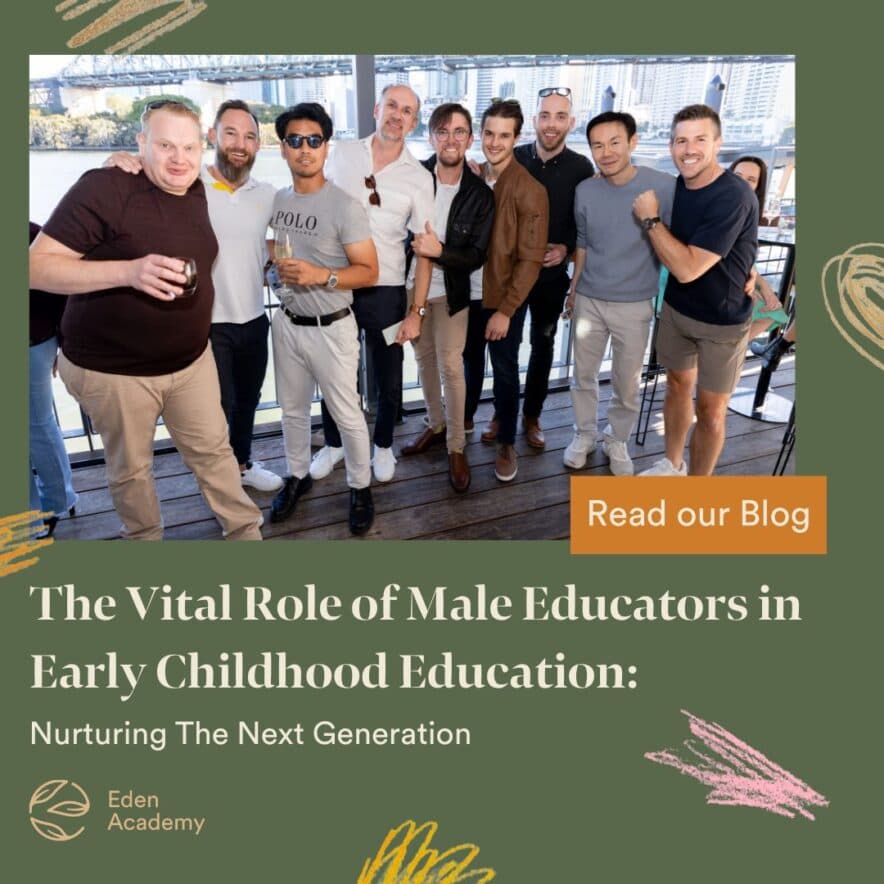Workforce
Jobs News
The Vital Role of Male Educators in Early Childhood Education: Nurturing The Next Generation

Freya Lucas
Jul 17, 2023
Save
It is true that early childhood education and care is predominantly a female-dominated industry (sic). While traditionally, this has always been the case, the importance of male educators in today’s classrooms should not be underestimated or forgotten. In early childhood education and care, the presence of male educators is not only valuable but imperative and something that we at Eden Academy encourage and celebrate. By breaking gender stereotypes and offering diverse role models, male educators provide countless benefits to children’s holistic development and open up a whole new world of possibilities for our little ones.
Breaking gender stereotypesChildren are highly impressionable, and by having male role models present in the early years, children learn that men can be nurturing, compassionate, and caring just as women can be. This exposure helps broaden their understanding of traditional “gender roles” and cultivates an inclusive mindset from an early age, demonstrating that all people can be caring and should be caring to one another.
As children grow and young boys witness male educators in positions of authority and affection, they receive validation for their own emotions and nurturing qualities. This reinforces the idea that emotional intelligence and empathy are essential qualities for everybody. The presence of male educators helps them understand that they can aspire to any career and break free from gender-based limitations. It fosters a sense of empowerment and resilience, encouraging them to pursue their dreams unapologetically.
We also cannot forget the important role that our male cooks play in our centres and how they inspire children each and every day. By showcasing their culinary skills and challenging the notion that cooking is solely what they might observe their mum doing, these individuals play a crucial role in promoting gender equality and inclusivity. When children observe men engaged in various roles, such as culinary arts, it sends a powerful message regarding the importance of equal opportunities and opens up possibilities for their future endeavours.
Diverse perspectives and learning styles
Male educators bring unique perspectives and teaching styles to the early childhood education setting. Just as each child is an individual, educators also possess their own strengths, talents, and approaches to teaching. Children can benefit from a wider range of teaching methods and experiences by having a diverse group of educators, including male educators. A diverse range of educators means diverse communication styles and problem-solving approaches, which can resonate with certain children who may thrive under their guidance. Different energy, playfulness, and interests can also create a balance in the learning environment, catering to all children’s diverse needs and preferences. By embracing various teaching styles, children can learn and grow in a way that is best suited to their individual learning styles and personalities.
Role models and emotional development
The National Quality Framework states that when children establish respectful and equitable relationships with their educators they:
- Feel secure, which frees them to explore, play and learn
- Contribute to that child’s sense of identity
- Offer opportunities for children to learn how to interact with others: respect others’ rights, be appropriately assertive, show caring, negotiate and resolve conflicts
- Enable effective teaching and learning.
So it is more important than ever to allow children to build these connections with a diverse range of people, including male educators, as these respectful and equitable relationships set the foundations for how children view the world around them. Children learn by their example, observing and interacting with male educators as they witness important life lessons, such as respect, empathy, and cooperation. Male educators also serve as strong figures to look up to for children lacking positive male role models in their early years. They help instill a sense of stability and trust, promoting healthy social and emotional development.
Fostering gender equality and inclusivity
By promoting the inclusion of male educators, we take a significant step towards achieving gender equality in early childhood education. This exposure to diversity at an early age sets the foundation for an inclusive society. The presence of male educators in early childhood education settings also encourages men to pursue careers in this field. By diversifying the workforce, we provide equal opportunities for both men and women, challenging the stereotypes that limit career choices based on gender. Male educators play a vital role in breaking down these barriers and paving the way for future generations to pursue their passions and talents freely.
The importance of male educators in early childhood education cannot be overstated. By breaking gender stereotypes, offering diverse perspectives, and serving as positive role models, they create a nurturing environment that benefits all children. By embracing and advocating for male educators in early childhood education, we empower our children to grow up in a world that values inclusivity, equality, and the limitless potential of every individual. Let us celebrate and support the vital role of male educators in nurturing tomorrow’s generation.
Don’t miss a thing
Related Articles



















